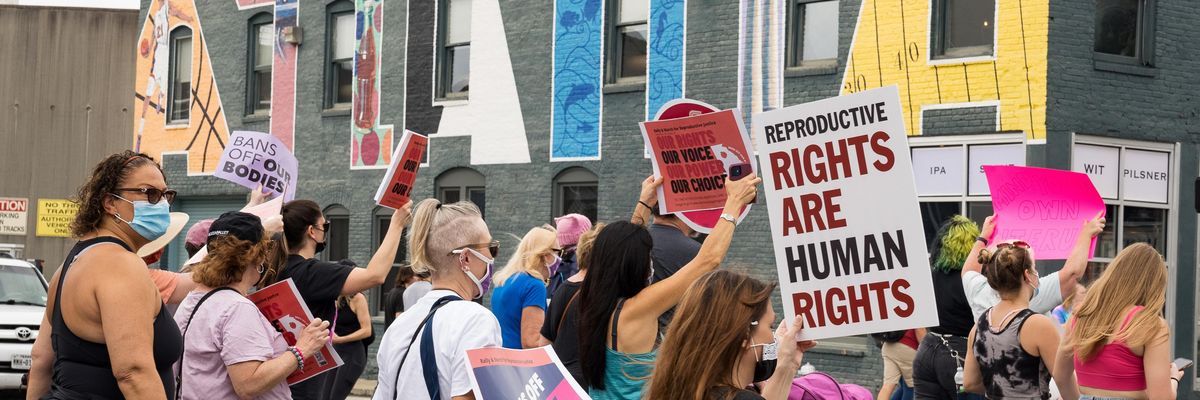Reproductive rights advocates responded with outrage Wednesday after the Georgia Supreme Court reinstated the state's draconian law prohibiting abortions after six weeks of pregnancy.
"This ban has wreaked havoc on Georgians' lives, and our patients deserve better."
The Fulton County Superior Court blocked the six-week abortion ban just last week, after which Georgia reverted to the status quo ante of permitting abortion care through 22 weeks of pregnancy. But in a one-page order, the high court granted an emergency stay of the lower court's injunction, thus allowing the six-week ban--which cuts off abortion access before many people know they are pregnant--to take immediate effect once again while the state's appeal proceeds.
"It is unconscionable that the Georgia Supreme Court has chosen to deny pregnant people the ability to decide what is best for their own lives and futures," Amy Kennedy, vice president for external affairs at Planned Parenthood Southeast, said in a statement. "Our state's abortion providers are again being forced to turn away patients who then must leave the state for safe, time-sensitive, and essential healthcare."
Kwajelyn Jackson, executive director of Feminist Women's Health Center, echoed that sentiment.
"It is cruel that our patients' ability to access the reproductive healthcare they need has been taken away yet again," said Jackson. "For the second time this year, we are being forced to turn away those in need of abortion care beyond six weeks of pregnancy. This ban has wreaked havoc on Georgians' lives, and our patients deserve better."
The state Supreme Court did not provide any explanation for granting the attorney general's request to put the lower court's November 15 order striking down the six-week abortion ban on hold.
Fulton County Superior Court Judge Robert McBurney ruled last week that laws that violate the Georgia or U.S. Constitution when they are passed are invalid. Republican Gov. Brian Kemp signed Georgia's six-week abortion ban into law in the spring of 2019, when Roe v. Wade was still in force. It went into effect in July, after the U.S. Supreme Court overturned the constitutional right to abortion.
In its Wednesday ruling, the Georgia Supreme Court also rejected abortion providers' request for 24 hours' notice prior to reviving the ban. As the Center for Reproductive Rights (CRR) explained, this means that abortion patients who were in waiting rooms when the decision was handed down "are being turned away and forced to seek healthcare elsewhere or else carry pregnancies to term against their will."
"Evidence shows that being denied an abortion can have lasting health and financial consequences for people and their families, including elevated health risks during and after pregnancy; and derailed educational, career, and life plans," CRR pointed out. "For some, the consequences of the ban can be deadly."
Alice Wang, staff attorney at CRR, said that "it is outrageous that this extreme law is back in effect, just days after being rightfully blocked."
"This legal ping pong is causing chaos for medical providers trying to do their jobs and for patients who are now left frantically searching for the abortion services they need," said Wang. "Georgians are again being denied control over their own lives and futures, but we will do everything in our power to strike down this ban for good."
As CRR noted:
During a trial held in October, healthcare providers and other experts testified that the abortion ban has had devastating consequences for Georgians' health and lives. The ban forces Georgians seeking abortion after the earliest weeks of pregnancy to travel hundreds or even thousands of miles out of state for care, and that's only if they can pull together the resources to do so. Georgians and other people seeking care in states where abortion is still legal face long wait times for appointments. Many of those who cannot surmount the tremendous financial and logistical barriers of getting abortion care in other states are forced to carry their pregnancy to term and give birth against their will.
Julia Kaye, staff attorney with the ACLU's Reproductive Freedom Project, warned Wednesday that the state Supreme Court's decision will "exacerbate Georgia's maternal mortality and morbidity crisis."
"Reinstating this extreme abortion ban will cause immense harm, especially to Black Georgians and people with the fewest resources--who are least likely to be able to travel out of state for care and most likely to suffer severe medical consequences from forced pregnancy and childbirth," said Kaye.
Andrea Young, executive director of the ACLU of Georgia, said that Wednesday's ruling makes it "even more important that we protect access in other states by preventing the U.S. Senate from passing a federal ban on abortion."
Republicans have threatened to pursue a nationwide abortion ban if they retake both chambers of Congress and the White House in 2024. The U.S. already has a substantially higher maternal mortality rate than other wealthy countries, and according to a recent analysis, prohibiting abortion at the federal level would increase maternal deaths by 24%.
"While this ruling is devastating, the case is not over," Kaye stressed. "We will never stop fighting to ensure that everyone, no matter their geography, race, or income, has the power to control their own bodies and futures."

